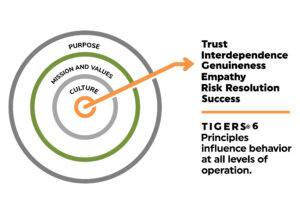
In today’s hyper-competitive job market, retaining top talent is more crucial than ever. As a millennial manager navigating this landscape, you understand the importance of resolving the employee retention dilemma. Retaining skilled employees is essential to the success of your team and organization. This blog post explores how the Millennial Manager’s Blueprint, infused with TIGERS 6 Principles™, offers effective solutions to the challenge of employee retention by leveraging the power of collaborative group processes.
Understanding the Challenge
The current job market presents unique challenges for retaining employees. This is especially true among younger generations like millennials and Gen Z. With more options available than ever before, employees are increasingly willing to explore new opportunities. If they feel unsatisfied or undervalued in their current roles expect a revolving door. This turnover can disrupt team dynamics, impact productivity, and ultimately hinder organizational growth.
Millennial managers often face greater challenges with employee retention due to several factors inherent in the current job market landscape. First, younger generations like millennials and Gen Z tend to prioritize factors such as meaningful work, career advancement opportunities, and work-life balance. If they feel unsatisfied or undervalued in their current roles, they are more likely to seek out alternative opportunities that better align with their values and aspirations.
Additionally, the proliferation of job search platforms and networking opportunities has made it easier than ever for employees to explore new career options. With a multitude of choices available, employees are increasingly willing to take risks and pursue opportunities that offer greater fulfillment and growth potential. This heightened mobility can lead to higher turnover within organizations, disrupting team dynamics, effective group process and impacting overall productivity.
Furthermore, millennial managers may face additional pressure to retain talent due to the demographic makeup of their teams. Millennials and Gen Z collectively comprise a significant portion of the workforce, and their preferences and expectations differ from those of previous generations. As such, millennial managers must adapt their leadership styles and organizational practices to meet the evolving needs of their younger team members, including providing opportunities for skill development, career progression, and meaningful engagement.
So how do you add those activities to your skill set when you may already feel stretched too thin whether training is provided for you or not?
Overall, the combination of changing workforce demographics, evolving employee expectations, and increased job market mobility presents unique challenges for millennial managers. It can be a juggling feat to strive to retain top talent and foster a cohesive and productive team environment.
The Millennial Manager’s Blueprint
As a millennial manager, you possess unique insights into the needs and preferences of your fellow millennials and Gen Z employees. The Millennial Manager’s Blueprint white paper serves as a comprehensive guide to building a workplace culture that fosters engagement, trust, and loyalty among team members. By integrating the TIGERS 6 Principles—Trust, Interdependence, Genuine Interactions, Empathy, Risk Resolution, and Success—into your management approach, you can create an environment where employees feel valued, supported, and empowered to thrive.
 About TIGERS Success Series
About TIGERS Success Series